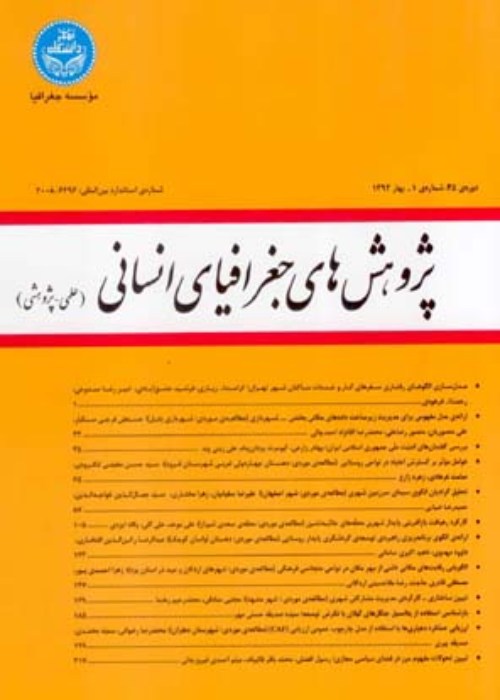Geography of Transnational Islam and Foreign Policy of Islamic Republic of Iran
Author(s):
Abstract:
Introduction
According to the teachings of Islam، jurists and scholars are providing a global picture of the transnational system which is clearly different from the current political system evolved since the Westphalia treaty. The first feature of such a system is to ignore the national government and the states territory. Islam recognizes the ideological borders and a nation state based on ideas or principles that leads to mutual coherence and unity among Muslims. According to these intelligentsia، dispersion and scattering in Muslim world، is the result of the direct manipulation of the imperialist powers that divided it into diverse nation states. Therefore، the thinking trend towards the third world among major decision makers of Islamic republic of Iran and the efforts for uniting such various and scattered block are due to the religious insights of decision makers and the historical experience of imperial power in the Islamic world. The aim of this study is to compare two different political thoughts known as Islamic thought which believes in a nation-centered system and nationalism which is called Westphalian from which national state is generated. This study attempts to evaluate the following hypotheses: a. Due to the divergence of nationality، Islam pays attention to ideological boundaries، the principle of national divergence، and ignorance of national government. It rejects geographic and political diversity in the human communities (ethnic، cultural، racial) and tries to establish a unified community with a powerful center. b. the above mentioned components need a particular foreign policy for Iran or any Muslim country which pays attention to Muslims، oppressed countries and the third World countries. Methodology
In the present study، we have tried to identify the differences between two approaches of transnational system of Islamic world and the Westphalian system. It was also attempted to investigate the reasons of relatively stable foreign policy of the Islamic Republic of Iran resulted from such an approach. To do so، we have tried to make use of an integration of different Humanities subjects such as political science، international relations، international law and geopolitics to develop a clear framework to deal with contradictions of the national government with Islamic government. Therefore، the research method was descriptive-analytic using deduction at large scale. We have also tried to make extensive use of library information including Islamic sources، Islamic political thought، and political and International law resources. Results And Discussion
With the exploration of historical data relating to the foreign relations of the past decade، we can find out that trends، decisions، actions، and foreign policiesof Iran in a dynamic and changing range has gone through different historical changes including thorough rejection of the foundations of Westphalian system and reconciliation and tolerance and acceptance of the existence of such a society and acting within the rules of the game. Accordingly، in the early stages of the revolution and the establishment of a new political system in Iran، maintaining the principles of international societies such as national government were ignored and the establishment of an ideal system controlled by global government of Islam was emphasized. In the second decade of the Islamic republic of Iran، while using some of the past experiences، developing relationships and partnerships with other governments، active participation in international institutions، utilizing of external resources، especially in technical and economic fields as vital factors، were emphasized. However، the transnational system of Islamic world at present is supported by Islamic republic of Iran and some of Muslim countries. It has components such as the trend towards establishing an Islamic block، attention to the third world countries، supporting the poor in the world and replacing Islamic international Law as a base for political behavior of Islamic governments. Conclusion
It could be concluded that there is a clear difference between the two trends of transnational systems of Islam world (which is built on ideological principles) and national branching principle. Transnational system of Islam world ignores national government and territories of the other governments and instead recognizes ideological boundaries and divides the world into two blocks: Islam and Blasphemy. In contrast to this system we can findWestphalian system which is built upon geopolitical hierarchy. The most important feature of such system is the emergence، growth and development of the national governments which extends all around the world even the world of Islam. Political behavior and foreign relations of Islamic republic of Iran during the last three decades indicate the absolute rejection of Westphalian system. Thus، in the first decade of revolution، the maintaining principles of International system، including national governments، international institutions، the balance of power، the role of international forces were rejected and ignored. But in the second decade، while keeping some of the previous components، developing relations and cooperation with other states، active participation in international institutions، using external sources particularly technical and economic ones were highlighted as very necessary.Keywords:
Language:
Persian
Published:
Human Geography Research Quarterly, Volume:45 Issue: 86, 2014
Pages:
119 to 136
magiran.com/p1225263
دانلود و مطالعه متن این مقاله با یکی از روشهای زیر امکان پذیر است:
اشتراک شخصی
با عضویت و پرداخت آنلاین حق اشتراک یکساله به مبلغ 1,390,000ريال میتوانید 70 عنوان مطلب دانلود کنید!
اشتراک سازمانی
به کتابخانه دانشگاه یا محل کار خود پیشنهاد کنید تا اشتراک سازمانی این پایگاه را برای دسترسی نامحدود همه کاربران به متن مطالب تهیه نمایند!
توجه!
- حق عضویت دریافتی صرف حمایت از نشریات عضو و نگهداری، تکمیل و توسعه مگیران میشود.
- پرداخت حق اشتراک و دانلود مقالات اجازه بازنشر آن در سایر رسانههای چاپی و دیجیتال را به کاربر نمیدهد.
دسترسی سراسری کاربران دانشگاه پیام نور!
اعضای هیئت علمی و دانشجویان دانشگاه پیام نور در سراسر کشور، در صورت ثبت نام با ایمیل دانشگاهی، تا پایان فروردین ماه 1403 به مقالات سایت دسترسی خواهند داشت!
In order to view content subscription is required
Personal subscription
Subscribe magiran.com for 70 € euros via PayPal and download 70 articles during a year.
Organization subscription
Please contact us to subscribe your university or library for unlimited access!



